Daily Vocabulary Words: Enhance Your Lexicon with Leading Newspapers & Publications
Welcome to the Daily Vocabulary section at Wordpandit!
Our mission is straightforward: to bring you essential vocabulary words featured in top newspapers and publications worldwide. By focusing on words you’ll encounter in renowned sources, we aim to help you enhance your vocabulary effectively and practically.
Our selection includes words from:
– The New York Times
– The Washington Post
– Scientific American
– BBC
– The Guardian
– Psychology Today
– Wall Street Journal
– The Economist
– The Hindu
– The Times of India
– The Economic Times
– Hindustan Times
– Live Mint
– The Indian Express
– And many more.
We are committed to your vocabulary development. Simply visit this section regularly and explore the daily posts. This is your go-to repository for commonly used words, providing significant practical benefits by familiarizing you with vocabulary from the leading publications listed above.
Make it a habit to visit our website daily and expand your lexicon with words from top newspapers and publications. (edited)
WORD-1: EMBOLDENS
CONTEXT: When a survivor files a complaint, it emboldens others to speak up, especially when it involves serial offenders.
SOURCE: The Hindu
EXPLANATORY PARAGRAPH: Imagine if you were scared to try riding a bike, but then your friend cheers you on and makes you feel brave enough to give it a go. Emboldens means giving someone the courage or confidence to do something.
MEANING: Gives someone the courage or confidence to do something (verb).
PRONUNCIATION: em-BOHL-denz
SYNONYMS: Encourages, inspires, motivates, boosts, strengthens, heartens
USAGE EXAMPLES:
1. Her friend’s support emboldens her to speak up in class.
2. The team’s success emboldens them to aim higher.
3. A kind word can embolden someone to try new things.
4. His mentor’s advice emboldens him to pursue his dreams.
WORD-2: VULNERABLE
CONTEXT: The war is set to enter its eighth month, Mr. Biden looks increasingly vulnerable to its regional and domestic consequences.
SOURCE: The Hindu
EXPLANATORY PARAGRAPH: Imagine a baby bird that needs protection because it can’t fly yet and is very small. Vulnerable means being open to getting hurt or needing protection because you are not strong enough on your own.
MEANING: Open to being hurt or needing protection (adjective).
PRONUNCIATION: VUL-ner-uh-bul
SYNONYMS: Exposed, defenseless, weak, unprotected, susceptible, fragile
USAGE EXAMPLES:
1. The young deer was vulnerable to predators.
2. She felt vulnerable without her friends around.
3. The old bridge is vulnerable to heavy traffic.
4. Children are often vulnerable and need extra care.
WORD-3: RELENTLESSLY
CONTEXT: Biden officials have been working relentlessly to achieve a ceasefire and hostage deal between Israel and Hamas.
SOURCE: The Hindu
EXPLANATORY PARAGRAPH: Imagine if someone keeps trying to solve a puzzle without giving up, no matter how hard it is. Relentlessly means doing something with constant effort and determination, never stopping.
MEANING: With constant effort and determination, never stopping (adverb).
PRONUNCIATION: ree-LENT-less-lee
SYNONYMS: Persistently, tirelessly, unceasingly, continuously, incessantly, unremittingly
USAGE EXAMPLES:
1. She worked relentlessly to finish the project on time.
2. The dog barked relentlessly at the stranger.
3. He pursued his goals relentlessly, no matter the obstacles.
4. The rain fell relentlessly throughout the night.
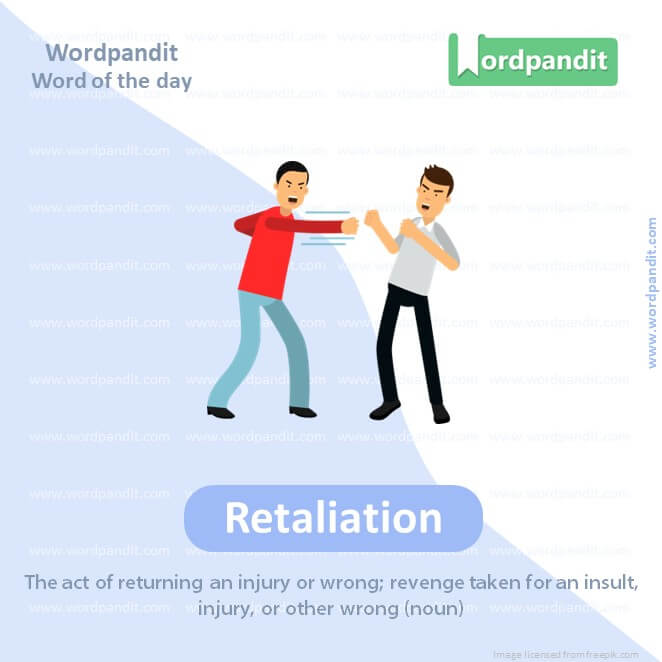
WORD-4: RETALIATION
CONTEXT: Mr. Biden’s timely response to shoot down the drones and missiles fired by Iran against Israel and his warning to the Prime Minister of Israel, Benjamin Netanyahu, that the U.S. would not join Israel’s retaliation against Iran, helped ease regional tensions.
SOURCE: The Hindu
EXPLANATORY PARAGRAPH: Imagine if someone pushed you, and you pushed them back to get even. Retaliation means doing something bad to someone because they did something bad to you first.
MEANING: The act of returning an injury or wrong; revenge taken for an insult, injury, or other wrong (noun)
PRONUNCIATION: ree-TAL-ee-ay-shun
SYNONYMS: Revenge, retribution, payback, vengeance, reprisal, counterattack
USAGE EXAMPLES:
1. The attack was in retaliation for the previous incident.
2. She feared retaliation after reporting the bullying.
3. Retaliation often leads to more conflict and hurt feelings.
4. He took no retaliation against those who wronged him.
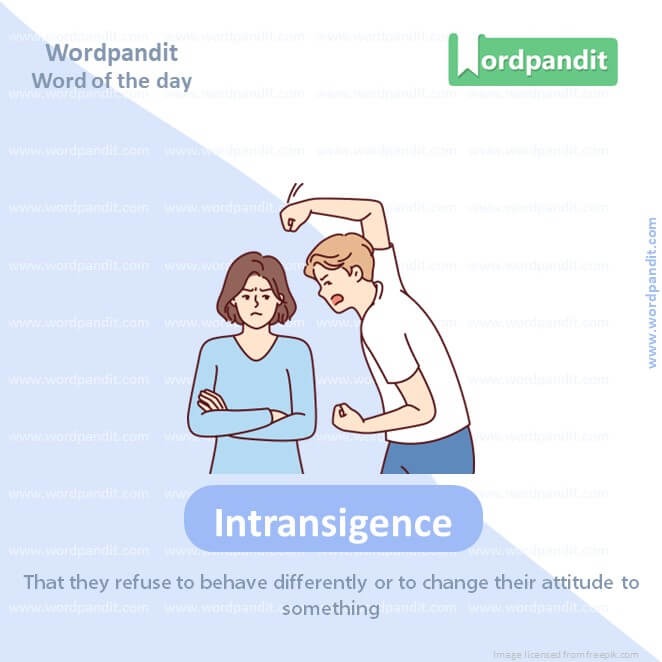
WORD-5: INTRANSIGENCE
CONTEXT: Even when Mr. Biden seemed frustrated with Mr. Netanyahu’s intransigence, he signed a Bill offering $17 billion in defense aid to Israel.
SOURCE: The Hindu
EXPLANATORY PARAGRAPH: Imagine if you wanted to play a game, but your friend refuses to play anything else and won’t change their mind. Intransigence means being very stubborn and not willing to change your mind.
MEANING: That they refuse to behave differently or to change their attitude to something
PRONUNCIATION: in-TRAN-sih-jens
SYNONYMS: Stubbornness, inflexibility, rigidity, obstinacy, uncompromising attitude, unyieldingness
USAGE EXAMPLES:
1. His intransigence made it difficult to reach an agreement.
2. The negotiations stalled due to intransigence on both sides.
3. Her intransigence about the rules caused frustration.
4. Intransigence can prevent finding a good solution.
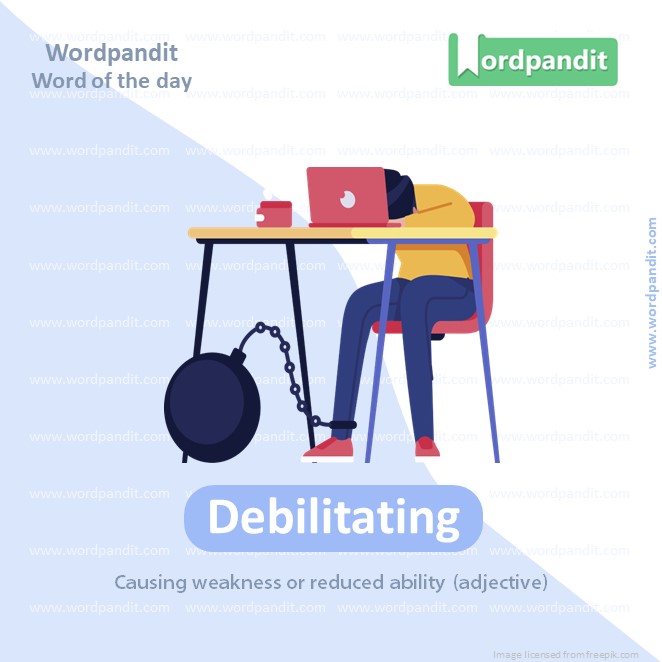
WORD-6: DEBILITATING
CONTEXT: Mr. Biden’s words and diplomatic efforts for truce are actually not matched by strong actions to pressure Israel. And, by continuing to arm and bankroll Israel’s genocidal war on Palestinians, Mr. Biden is debilitating his own moral arguments about foreign policy.
SOURCE: The Hindu
EXPLANATORY PARAGRAPH: Imagine if you have a really bad cold that makes you too weak to play or do anything fun. Debilitating means making someone very weak and unable to do things they normally can.
MEANING: Causing weakness or reduced ability (adjective)
PRONUNCIATION: dih-BIL-ih-tay-ting
SYNONYMS: Weakening, crippling, exhausting, draining, incapacitating, paralyzing
USAGE EXAMPLES:
1. The illness was so debilitating that he couldn’t get out of bed.
2. Her injury had a debilitating effect on her career.
3. The heat can be debilitating during the summer.
4. A debilitating fear kept him from trying new things.
WORD-7: SULLYING
CONTEXT: Mr. Biden’s inability to rein in Israel is weakening America’s standing in West Asia and sullying his already fragile candidacy in the U.S. presidential elections in November.
SOURCE: The Hindu
EXPLANATORY PARAGRAPH: Imagine if someone spilled paint on your favorite drawing and made it dirty. Sullying means making something dirty or ruining its good reputation.
MEANING: Making something dirty or ruining its good reputation (verb).
PRONUNCIATION: SUL-ee-ing
SYNONYMS: Tarnishing, staining, defiling, soiling, spoiling, besmirching
USAGE EXAMPLES:
1. The scandal sullied his good name.
2. She feared sullying her dress with mud.
3. His actions sullied the family’s reputation.
4. The river was sullied by pollution.
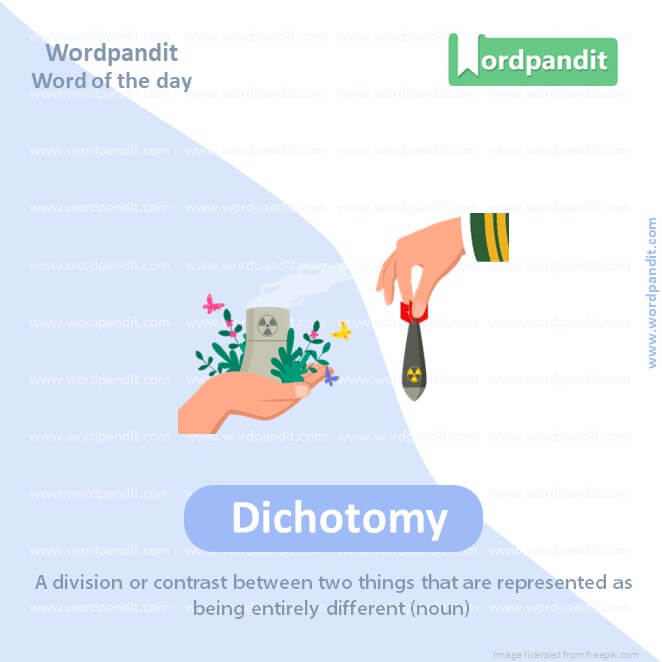
WORD-8: DICHOTOMY
CONTEXT: This dichotomy has profound implications for New Delhi’s global aspirations.
SOURCE: The Hindu
EXPLANATORY PARAGRAPH: Imagine a picture that is half sunny and half rainy. A dichotomy is when something is divided into two very different and opposite parts.
MEANING: A division or contrast between two things that are represented as being entirely different (noun)
PRONUNCIATION: dye-KOT-uh-mee
SYNONYMS: Contrast, division, split, separation, difference, polarity
USAGE EXAMPLES:
1. The dichotomy between good and evil is often explored in stories.
2. There is a clear dichotomy between his work life and personal life.
3. The debate highlighted the dichotomy in opinions.
4. She struggled with the dichotomy of her feelings.
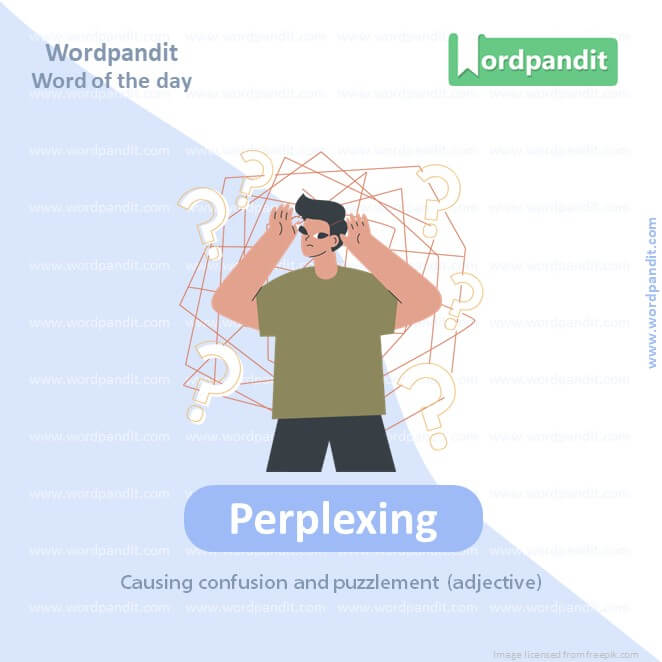
WORD-9: PERPLEXING
CONTEXT: One of the deeply perplexing paradoxes of contemporary Indian foreign
policy is that a globally rising India is also a regionally declining power.
SOURCE: The Hindu
EXPLANATORY PARAGRAPH: Imagine a puzzle that is really hard to solve and makes you scratch your head. Perplexing means something that is very confusing and hard to understand.
MEANING: Causing confusion and puzzlement (adJectlve)
PRONUNCIATION: per-PLEKS-ing
SYNONYMS: Confusing, puzzling, baffling, bewildering, mystifying, complicated
USAGE EXAMPLES:
1. The instructions were so perplexing that no one could follow them.
2. The mystery was perplexing to even the best detectives.
3. She found his behavior perplexing and strange.
4. The math problem was perplexing for the students.
WORD-10: EXTRANEOUS
CONTEXT: This comparative decline, not an absolute one, caused by several extraneous factors, will have an impact on India’s global position over time.
SOURCE: The Hindu
EXPLANATORY PARAGRAPH: Imagine trying to color a picture but there are too many extra lines that don’t belong there. Extraneous means something extra that isn’t needed and doesn’t belong.
MEANING: Something extra that isn’t needed and doesn’t belong (adjective).
PRONUNCIATION: eks-TRAY-nee-us
SYNONYMS: Unnecessary, irrelevant, superfluous, unimportant, redundant, nonessential
USAGE EXAMPLES:
1. The essay had a lot of extraneous information that didn’t help.
2. Please remove any extraneous items from your desk.
3. The book was interesting, but it had some extraneous details.
4. He focused on the main points and ignored the extraneous noise.
Vocabulary English Words
In the enchanting performance of language learning, ‘vocabulary English words’ make up the musical notes that help us create harmonious communication. Mastering these words can seem like an arduous task at times; however, using the right learning strategies can make the process of learning ‘vocabulary English words’ smooth and enjoyable.
A crucial principle for learning ‘vocabulary English words’ is to focus on understanding, rather than memorizing. Engaging with varied materials such as novels, news articles, podcasts and digital content will expose you to a wide range of words in different contexts, giving a deeper insight into their meaning and usage.
Employing memory-enhancing techniques can significantly aid in the learning of ‘vocabulary English words’. Tools such as flashcards, language-learning apps, and mnemonic strategies ensure an effective and long-term learning experience. Mnemonic devices, linking words with personal and relatable stories or images, can help in creating better associations and improving recall.
Practice plays a vital role in mastering ‘vocabulary English words’. Using the new words in your routine conversations, written correspondence, or even digital interactions adds a practical aspect to your learning, making these words a part of your active vocabulary.
Furthermore, leisure activities such as crosswords, word games, or simple vocabulary quizzes are effective ways to make the learning of ‘vocabulary English words’ fun and interactive.
To conclude, the journey of learning ‘vocabulary English words’ demands a multi-faceted approach woven into our daily life. A balanced mix of understanding, usage of memory-enhancement tools, active application, and leisure activities can considerably ease the process of mastering ‘vocabulary English words’. Remember, each word learned is a tiny victory, bringing you one step closer to impeccable fluency and articulate expression in the beautiful symphony of the English language.













